An Understanding of Education in Supporting Cotton Production: An Empirical Study in Benin, West Africa
Abstract
1. Introduction
2. Materials and Methods
2.1. Study Area
2.2. Research Method
2.2.1. Research Framework
- The uneducated farmers are the first status. This status refers to a farmer who lacks education or understanding and act via their instincts.
- The second status pertains to farmers who are educated. In this situation, farmers with primary education are assumed to be conscious of their actions and enhance their production.
- The organic farmers comprise the third category. This model of the farmer is only exposed to technical practices, in this case, to boost production.
- The fourth classification is that of future farmers. In this scenario, the focus is on emergent farmers. It is a combination of educated farmers and organic farmers. It suggests that farmers with basic education skills mixed with professional training in growing organic cotton would be suitable for production in the study area.
2.2.2. Questionnaire Survey and Sampling
2.2.3. Statistical Analysis
3. Results
3.1. Matching Analysis
3.2. Model Results of Different Samples and Variables
3.3. Farmers Perception
3.4. Training Effect
4. Discussion
4.1. Determinants of Organic Cotton Cultivation
4.2. Policy Implications
4.3. Limitations and Outlook
5. Conclusions
Author Contributions
Funding
Institutional Review Board Statement
Informed Consent Statement
Data Availability Statement
Acknowledgments
Conflicts of Interest
References
- ICAC: Global Cotton Production to Decline in 2013–2014|AgWeb. Available online: https://www.agweb.com/news/crops/cotton/icac-global-cotton-production-decline-2013-14 (accessed on 19 April 2022).
- Udoh, E. Land Management and Resource-Use Efficiency among Farmers in Southeastern Nigeria. Ph.D. Thesis, University of Ibadan, Ibadan, Nigeria, 2000, unpublished. [Google Scholar]
- Vandenbosch, T. Post-Primary Agricultural Education and Training in Sub-Saharan Africa: Adapting Supply to Changing Demand; World Agroforestry Centre (ICRAF): Nairobi, Kenya, 2006; pp. 1–116. [Google Scholar]
- Agwu, A.E.; Ekwueme, J.N.; Anyanwu, A.C. Adoption of Improved Agricultural Technologies Disseminated via Radio Farmer Programme by Farmers in Enugu State, Nigeria. Afr. J. Biotechnol. 2008, 7, 1277–1312. [Google Scholar]
- Asoegwu, S.N.; Asoegwu, A.O. An Overview of Agricultural Mechanization and Its Environmental Management in Nigeria. CIGR J. 2007, IX, 22. [Google Scholar]
- Ton, P. Organic Cotton Production in Sub-Saharan Africa: The Need for Scaling Up. In Organic Cotton Production in Sub-Saharan Africa: The Need for Scaling Up. 2002. Available online: https://www.cabdirect.org/cabdirect/abstract/20053172095 (accessed on 19 April 2022).
- Schultz, T.W. Transforming Traditional Agriculture; Yale University Press: New Haven, CT, USA, 1964; Volume 70. [Google Scholar]
- Weir, S. The Effects of Education on Farmer Productivity in Rural Ethiopia; Centre for the Study of African Economies Department of Economics, University of Oxford: Oxford, UK, 1999; pp. 1–51. [Google Scholar]
- Alene, A.D.; Manyong, V.M. The Effects of Education on Agricultural Productivity under Traditional and Improved Technology in Northern Nigeria: An Endogenous Switching Regression Analysis. Empir. Econ. 2007, 32, 141–159. [Google Scholar] [CrossRef]
- Truelove, H.B.; Carrico, A.R.; Thabrew, L. A Socio-Psychological Model for Analyzing Climate Change Adaptation: A Case Study of Sri Lankan Paddy Farmers. Glob. Environ. Change 2015, 31, 85–97. [Google Scholar] [CrossRef]
- Deng, J.; Sun, P.; Zhao, F.; Han, X.; Yang, G.; Feng, Y. Analysis of the Ecological Conservation Behavior of Farmers in Payment for Ecosystem Service Programs in Eco-Environmentally Fragile Areas Using Social Psychology Models. Sci. Total Environ. 2016, 550, 382–390. [Google Scholar] [CrossRef] [PubMed]
- Li, H.; Feng, W.; He, X.; Zhu, P.; Gao, H.; Sun, N.; Xu, M. Chemical Fertilizers Could Be Completely Replaced by Manure to Maintain High Maize Yield and Soil Organic Carbon (SOC) When SOC Reaches a Threshold in the Northeast China Plain. J. Integr. Agric. 2017, 16, 937–946. [Google Scholar] [CrossRef]
- Abdulai, A.; Huffman, W. The Adoption and Impact of Soil and Water Conservation Technology: An Endogenous Switching Regression Application. Land Econ. 2014, 90, 26–43. [Google Scholar] [CrossRef]
- Asadullah, M.N.; Rahman, S. Farm Productivity and Efficiency in Rural Bangladesh: The Role of Education Revisited. Appl. Econ. 2009, 41, 17–33. [Google Scholar] [CrossRef]
- Azhar, R.A. Education and Technical Efficiency during the Green Revolution in Pakistan. Econ. Dev. Cult. Change 1991, 39, 651–665. [Google Scholar] [CrossRef]
- Chaudhri, D.P. Education, Innovations, and Agricultural Development: A Study of North India. Available online: https://www.taylorfrancis.com/books/mono/10.4324/9781003252351/education-innovations-agricultural-development-chaudhri (accessed on 20 April 2022).
- Mellor, J.W. The New Economics of Growth: A Strategy for India and the Developing World; A Twentieth Century Fund Study; Cornell University Press: Ithaca, NY, USA, 1976; ISBN 978-0-8014-9188-7. [Google Scholar]
- Pudasaini, S.P. The Effects of Education in Agriculture: Evidence from Nepal. Am. J. Agric. Econ. 1983, 65, 509–515. [Google Scholar] [CrossRef]
- Ram, R. Role of Education in Production: A Slightly New Approach. Q. J. Econ. 1980, 95, 365. [Google Scholar] [CrossRef]
- Singh, B. Impact of Education on Farm Production. Econ. Political Wkly. 1974, 9, A92–A96. [Google Scholar]
- Duraisamy, P. Effects of Education and Education Contacts on Agricultural Production. Ind. Jn. Agri. Ecom 1992, 47, 205–214. [Google Scholar]
- Young, D.; Deng, H. The Effects of Education in Early-Stage Agriculture: Some Evidence from China. Appl. Econ. 1999, 31, 1315–1323. [Google Scholar] [CrossRef]
- Jamison, D.T.; Lau, L.J. Farmer Education and Farm Efficiency; University Press: Baltimore, MD, USA, 1982. [Google Scholar]
- Mussa, R. The Effects of Educational Externalities on Maize Production in Rural Malawi. Oxf. Dev. Stud. 2015, 43, 508–532. [Google Scholar] [CrossRef]
- Knight, J.; Weir, S.; Woldehanna, T. The Role of Education in Facilitating Risk-Taking and Innovation in Agriculture. J. Dev. Stud. 2003, 39, 1–22. [Google Scholar] [CrossRef]
- Reimers, M.; Klasen, S. Revisiting the Role of Education for Agricultural Productivity. Am. J. Agric. Econ. 2013, 95, 131–152. [Google Scholar] [CrossRef]
- Appleton, S.; Balihuta, A. Education and Agricultural Productivity: Evidence from Uganda. J. Int. Dev. 1996, 8, 415–444. [Google Scholar] [CrossRef]
- Huang, F.-M.; Luh, Y.-H.; Huang, F.-M.; Luh, Y.-H. The Economic Value of Education in Agricultural Production: A Switching Regression Analysis of Selected East Asian Countries. In Proceedings of the International Association of Agricultural Economists Conference, Beijing, China, 16–22 August 2009. [Google Scholar]
- Chen, R.; Huang, J.; Qiao, F. Farmers’ Knowledge on Pest Management and Pesticide Use in Bt Cotton Production in China. China Econ. Rev. 2013, 27, 15–24. [Google Scholar] [CrossRef]
- Yang, P.; Iles, M.; Yan, S.; Jolliffe, F. Farmers’ Knowledge, Perceptions and Practices in Transgenic Bt Cotton in Small Producer Systems in Northern China. Crop Prot. 2005, 24, 229–239. [Google Scholar] [CrossRef]
- Schultz, T.W. The Value of the Ability to Deal with Disequilibria. J. Econ. Lit. 1975, 13, 827–846. [Google Scholar]
- Ali, M.; Byerlee, D. Economic Efficiency of Small Farmers in a Changing World: A Survey of Recent Evidence. J. Int. Dev. 1991, 3, 1–27. [Google Scholar] [CrossRef]
- Leena, S.; Cristovao, A.; Koutsouris, A.; Mulder, M.; Santucci, F.M.; Wielinga, E.; Juuti, P. (Eds.) 20th ESEE 2011: 20th European Seminar on Extension Education: Private-Public Partnerships for Advisory Services in Europa; JTO School of Management: Kirkkonummi, Finland, 2011; pp. 1–277. ISBN 978-951-9411-54-5. [Google Scholar]
- Mengech, A.N.; Saxena, K.N.; Gopalan, H.N.B. Integrated Pest Management in the Tropics: Current Status and Future Prospects; John Wiley & Sons: Hoboken, NJ, USA, 1995; pp. 1–171. [Google Scholar]
- Roling, N.G.; van de Fliert, E. Introducing Integrated Pest Management in Rice in Indonesia: A Pioneering Attempt to Facilitate Large-Scale Change. In Facilitating Sustainable Agriculture: Participatory Learning and Adaptive Management in Times of Environmental Uncertainty; Cambridge University Press: Cambridge, UK, 1998; pp. 153–171. [Google Scholar]
- Huang, J.; Hu, R.; Rozelle, S.; Qiao, F.; Pray, C.E. Transgenic Varieties and Productivity of Smallholder Cotton Farmers in China. Aust. J. Agric. Res. Econ. 2002, 46, 367–387. [Google Scholar] [CrossRef]
- Pemsl, D.; Waibel, H.; Gutierrez, A.P. Why Do Some Bt-Cotton Farmers in China Continue to Use High Levels of Pesticides? Int. J. Agric. Sustain. 2005, 3, 44–56. [Google Scholar] [CrossRef]
- Paltasingh, K.R.; Goyari, P. Impact of Farmer Education on Farm Productivity under Varying Technologies: Case of Paddy Growers in India. Agric. Econ. 2018, 6, 7. [Google Scholar] [CrossRef]
- Dossa, F.K.; Miassi, Y.E.S. Facteurs Socio-Economiques Influençant L’adoption de Coton Biologique Au Nord-Est Du Bénin: Cas de La Commune de Kandi. Int. J. Progress. Sci. Technol. 2018, 6, 577–584. [Google Scholar]
- Matthess, A. (Ed.) Le Coton Au Bénin: Compétitivité et Durabilité de Cinq Systèmes Culturaux Cotonniers Dans Le Cadre de La Filière; Ministère de l’Agriculture, de l’Elevage et de la Pêche (MAEP), Coopération Technique Allemande: Cotonou, Benin, 2005; ISBN 978-99919-55-53-7. [Google Scholar]
- Bassole, D.; Ouedraogo, L. Problématique de l’Utilisation des Produits Phytosanitaires en Conservation des Denrée Alimentaires et en Maraichage Urbain et Peri Urbain au Burkina Faso: Cas de Bobo Dioulasso, Ouhigouya et Ouagadougou; IFDC: Muscle Shoals, AL, USA, 2007. [Google Scholar]
- Memoire Online—Activités Agricoles et Dégradation Des Ressources Naturelles Dans La Commune de Ségbana (Bénin): Impacts Sur La Santé Des Populations—Aboubakar KISSIRA. Available online: https://www.memoireonline.com/06/07/474/m_activites-agricole-degradation-ressources-naturelle-segbana-impact-sante-populations8.html (accessed on 20 April 2022).
- Sinzogan, A.A.C.; Van Huis, A.; Kossou, D.K.; Jiggins, J.; Vodouhè, S. Farmers’ Knowledge and Perception of Cotton Pests and Pest Control Practices in Benin: Results of a Diagnostic Study. NJAS Wagening. J. Life Sci. 2004, 52, 285–303. [Google Scholar] [CrossRef][Green Version]
- Thivant, L. Training Manual for Organic Agriculture. 2017, pp. 1–105. Available online: https://www.fao.org/fileadmin/templates/nr/sustainability_pathways/docs/Compilation_techniques_organic_agriculture_rev.pdf (accessed on 20 April 2022).
- Liu, H.; Luo, X. Understanding Farmers’ Perceptions and Behaviors towards Farmland Quality Change in Northeast China: A Structural Equation Modeling Approach. Sustainability 2018, 10, 3345. [Google Scholar] [CrossRef]
- EconPapers: The Uses of Tobit Analysis. Available online: https://econpapers.repec.org/article/tprrestat/v_3a62_3ay_3a1980_3ai_3a2_3ap_3a318-21.htm (accessed on 20 April 2022).
- Karimov, A.A. Factors Affecting Efficiency of Cotton Producers in Rural Khorezm, Uzbekistan: Re-Examining the Role of Knowledge Indicators in Technical Efficiency Improvement. Agric. Econ. 2014, 2, 2–16. [Google Scholar] [CrossRef]
- Chaudhry, I.S.; Khan, M.B.; Anwar, M. Factors Affecting Cotton Production in Pakistan: Empirical Evidence from Multan District. J. Qual. Technol. Manag. 2009, 5, 91–100. [Google Scholar]
- Critchley, W.; Graham, O. Looking after Our Land: Soil and Water Conservation in Dryland Africa; Oxfam: Oxford, UK, 1991; ISBN 978-0-85598-170-9. [Google Scholar]
- Nguyen, T.; Cheng, E. Productivity Gains from Farmer Education in China. Aust. J. Agric. Resour. Econ. 1997, 41, 471–497. [Google Scholar] [CrossRef]
- Lockheed, M.E.; Jamison, T.; Lau, L.J. Farmer Education and Farm Efficiency: A Survey. Econ. Dev. Cultural Change 1980, 29, 38–75. [Google Scholar] [CrossRef]
- Ying, R.; Zhou, L.; Hu, W.; Pan, D. Agricultural Technical Education and Agrochemical Use by Rice Farmers in China. Agribusiness. 2017, 33, 522–536. [Google Scholar] [CrossRef]
- Sitakanta, P. Farmer Education and Household Agricultural Income in Rural India. Int. J. Soc. Econ. 2015, 42, 6. [Google Scholar]
- Yong-Qi, Z. Research on the Influencing Factors and Cultivation Strategies of New Professional Farmers’ Training Willingness from the Perspective of Public Policy Science. In Proceedings of the 1st International Conference on Contemporary Education and Economic Development (CEED 2018), Bali, Indonesia, 17–18 November 2018; Atlantis Press: Bali, Indonesia, 2018. [Google Scholar]
- Zheng, Y.; Luo, C.; Cao, C.; Wei, Q.; Yu, J. Research on the Training Effect of New Farmers in Beijing. In Proceedings of the 2017 3rd International Conference on Humanities and Social Science Research (ICHSSR 2017), Guangzhou, China, 12–14 May 2014; Atlantis Press: Guangzhou, China, 2017. [Google Scholar]
- Schiere, H.; Kater, L. Mixed Crop-Livestock Farming: A Review of Traditional Technologies Based on Literature and Field Experiences; FAO Animal Production and Health Paper; FAO: Rome, Italy, 2001; ISBN 978-92-5-104576-3. [Google Scholar]
- BOSTID. Food, Fuel, and Fertilizer from Organic Wastes; National Academy: Washington, DC, USA, 1981; p. 154. [Google Scholar]
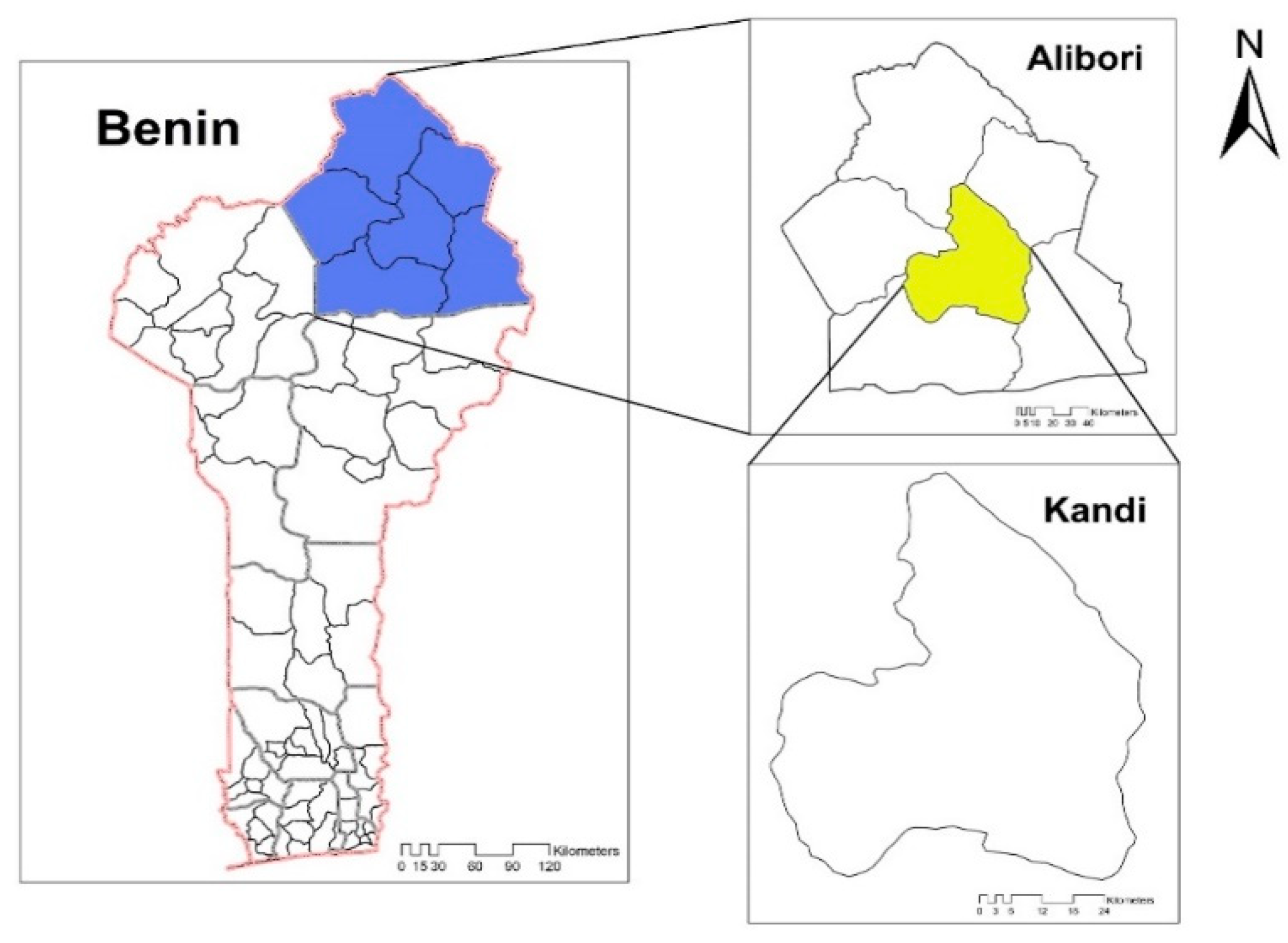
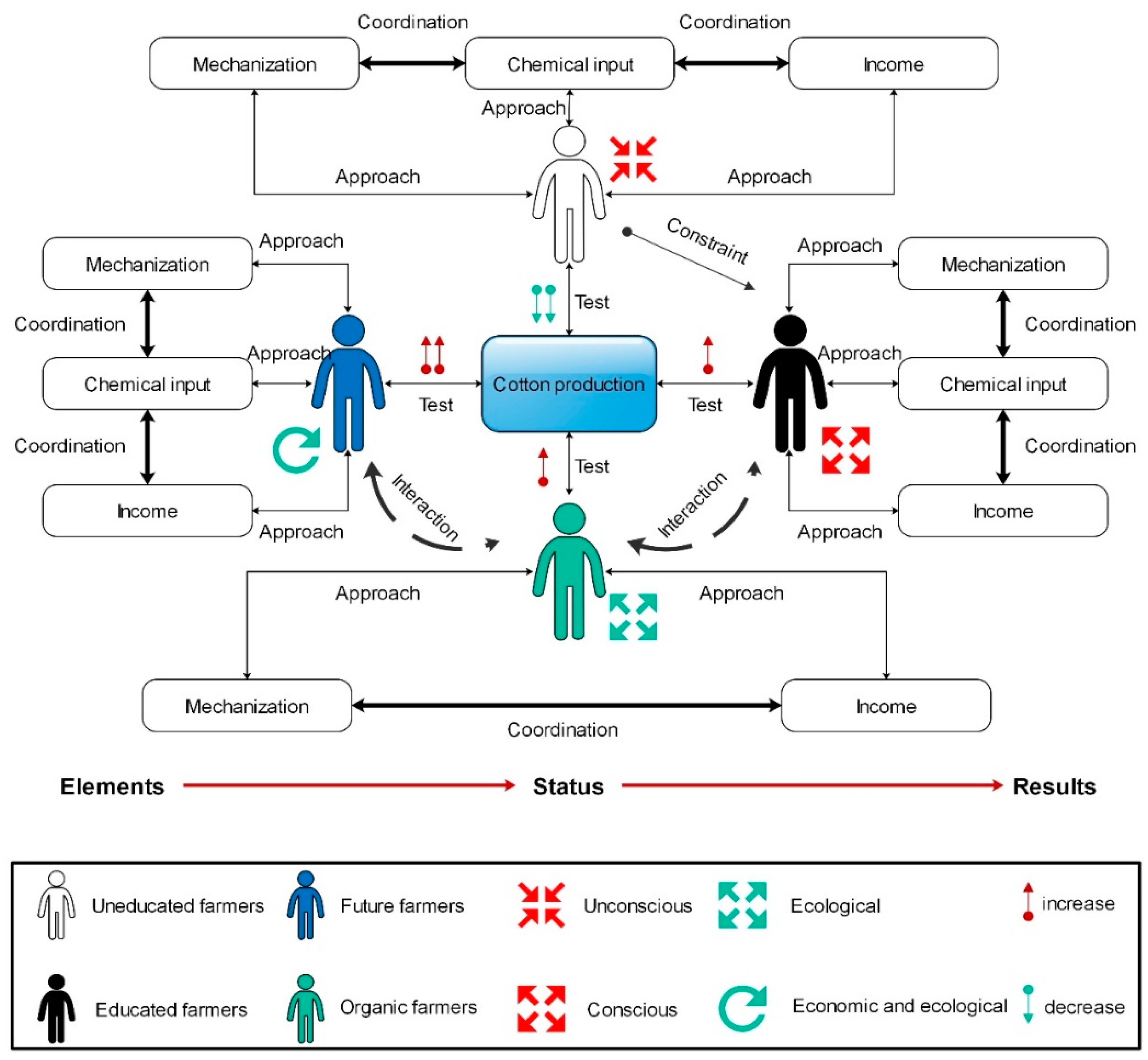
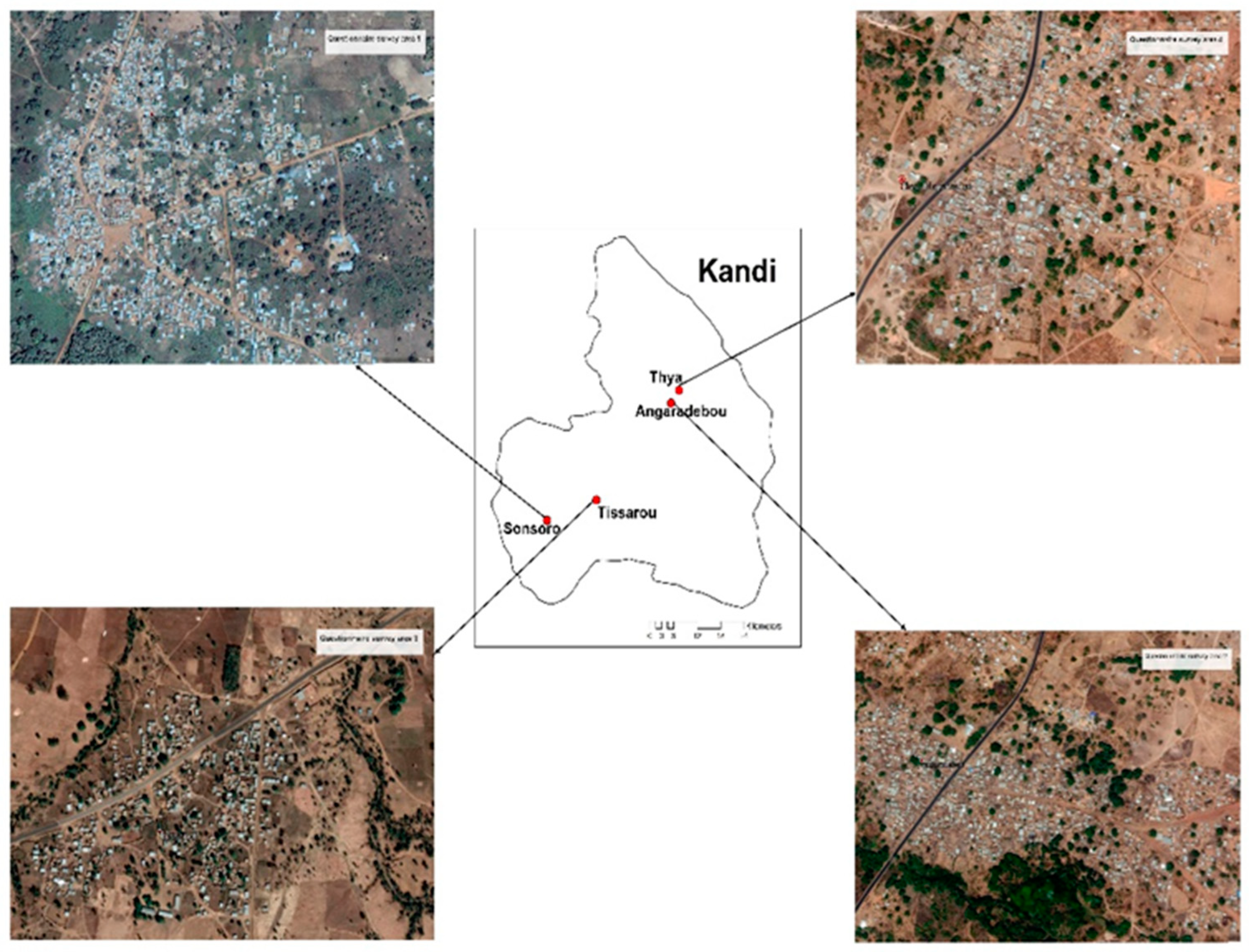
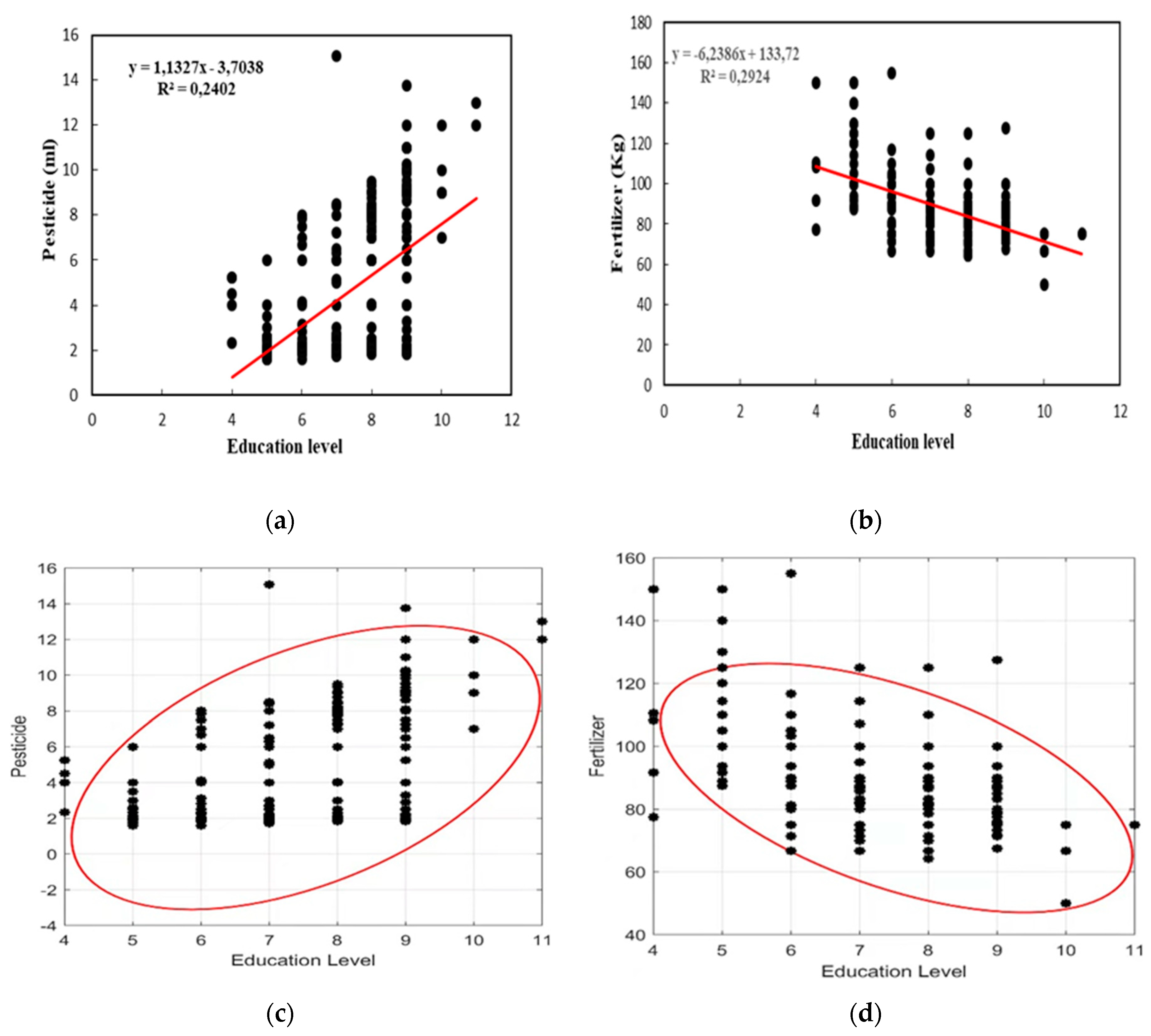
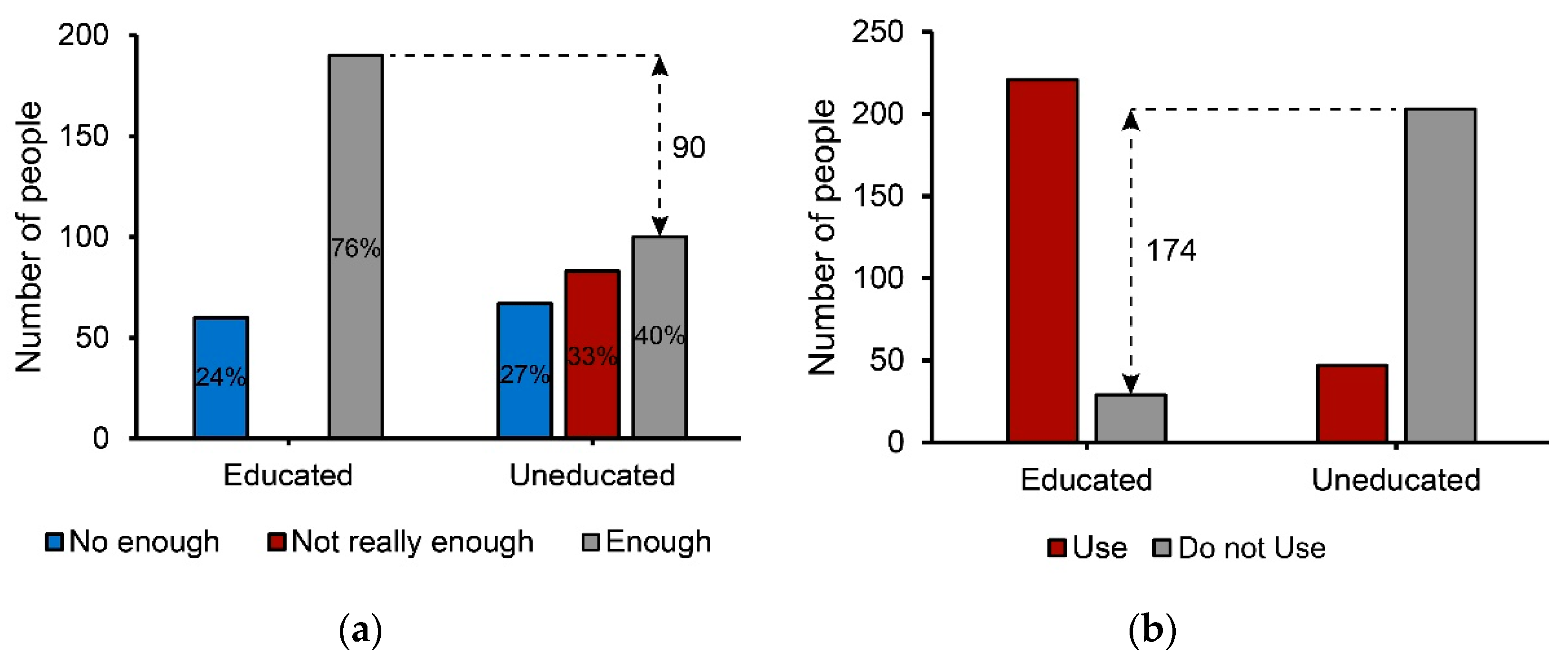
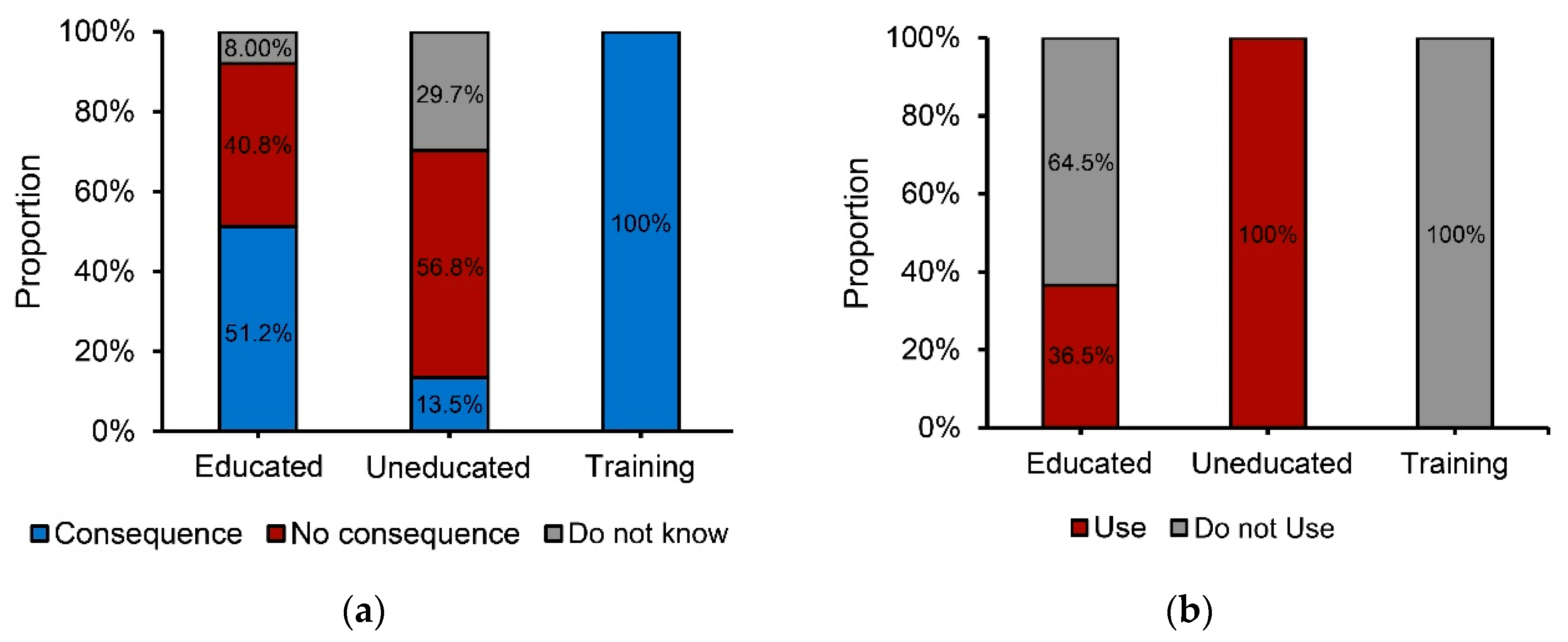

| Indicators | Kandi |
|---|---|
| Literacy rate for ages 6 years and over (%) | 25.9 |
| Adult literacy rate (15 years and over) (%) | 20.7 |
| Adult literacy rate (15 years and over) in the French language (%) | 19.7 |
| Adult literacy rate (15 years and over) in the national language (%) | 3.8 |
| Net enrollment rate (6–11 years) (%) | 33.8 |
| Secondary school enrollment rate (12–19 years) (%) | 18.6 |
| Surveyed District | Total Number of Households | Number of People Surveyed | Percentage (%) |
|---|---|---|---|
| Angaradebou and Thya | 14,845 | 360 | 2.42 |
| Sonsoro | 11,408 | 125 | 1.09 |
| Dowari (Tissarou) | 10,381 | 125 | 1.20 |
| Total | 36,634 | 610 | 4.71 |
| Variables | Coefficient | Std. Error | t (Values) | Prob. |
|---|---|---|---|---|
| Pesticides | 0.04157 | 0.016998 | 3.053828 | 0.0025 |
| Fertilizer | 0.04401 | 0.014413 | 2.445679 | 0.0152 |
| Input | 0.04636 | 0.010166 | 4.561067 | 0.0000 |
| Constant | −5.08677 | 0.211007 | −24.10708 | 0.0000 |
| R2 | 0.95637 | |||
| Adjusted R2 | 0.95565 | |||
| Prob(F-statistic) | 0.00000 |
| Variables | Coefficient | Std. Error | t (Values) | Prob. |
|---|---|---|---|---|
| Pesticides | 0.51862 | 0.015328 | 3.383339 | 0.0008 |
| Fertilizer | 0.51957 | 0.011502 | 4.517286 | 0.0000 |
| Input | 0.01710 | 0.006578 | 2.600665 | 0.0099 |
| EL | 0.00109 | 0.002045 | 0.536860 | 0.5919 |
| Constant | −4.65266 | 0.055221 | −84.25506 | 0.0000 |
| R2 | 0.99740 | |||
| Adjusted R2 | 0.99735 | |||
| Prob(F-statistic) | 0.00000 |
Publisher’s Note: MDPI stays neutral with regard to jurisdictional claims in published maps and institutional affiliations. |
© 2022 by the authors. Licensee MDPI, Basel, Switzerland. This article is an open access article distributed under the terms and conditions of the Creative Commons Attribution (CC BY) license (https://creativecommons.org/licenses/by/4.0/).
Share and Cite
Jacquet, I.; Wang, J.; Zhang, J.; Wang, K.; Liang, S. An Understanding of Education in Supporting Cotton Production: An Empirical Study in Benin, West Africa. Agriculture 2022, 12, 836. https://doi.org/10.3390/agriculture12060836
Jacquet I, Wang J, Zhang J, Wang K, Liang S. An Understanding of Education in Supporting Cotton Production: An Empirical Study in Benin, West Africa. Agriculture. 2022; 12(6):836. https://doi.org/10.3390/agriculture12060836
Chicago/Turabian StyleJacquet, Iskid, Jieyong Wang, Jianjun Zhang, Ke Wang, and Sen Liang. 2022. "An Understanding of Education in Supporting Cotton Production: An Empirical Study in Benin, West Africa" Agriculture 12, no. 6: 836. https://doi.org/10.3390/agriculture12060836
APA StyleJacquet, I., Wang, J., Zhang, J., Wang, K., & Liang, S. (2022). An Understanding of Education in Supporting Cotton Production: An Empirical Study in Benin, West Africa. Agriculture, 12(6), 836. https://doi.org/10.3390/agriculture12060836









